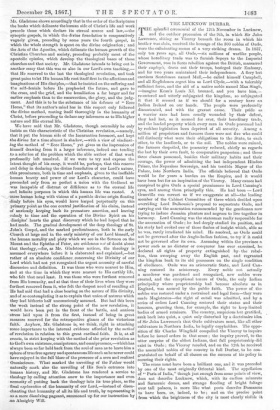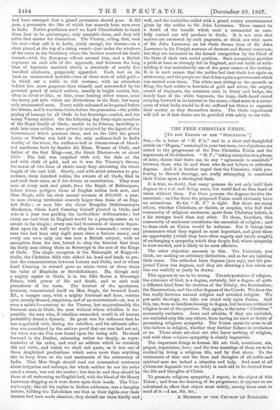THE LUCKNOW DLTRBAR.
THE splendid ceremonial of the 12th November in Lucknow, and the outdoor procession of the 9th, in which Sir John Lawrence, sitting as Viceroy beneath the room in which his brother was slain, received the homage of the 300 nobles of Oude, were the culminating scenes of a very striking drama. In 1857, only ten years ago, all Oude,—six millions of warlike people, whose hereditary trade was to furnish Sepoys to the Imperial Government, rose in fierce rebellion against the British, massacred their employe's, drove out their troops, besieged their Embassy, and for two years maintained their independence. A fiery but cautious Scotchman named Mull,—he called himself Campbell, and all Englishmen regret him as Lord Clyde,—with a tolerably sufficient force, and the aid of a native noble named Man Singh, —imagine Kean's Louis XI. bronzed, and you have him,— re-entered and utterly subjugated the kingdom, so subjugated it that it seemed as if we should for a century have an Indian Ireland on our bands. The people were profoundly discontented, and with the gravest cause. Their pride as a warrior race had been cruelly wounded by their defeat, they had lost, as it seemed for ever, their hereditary trade, and the landed property which every man in Oude possessed had by reckless legislation been deprived of all security. Among a million of proprietors and farmers there were not five who could tell distinctly what were their obligations to the State, to each other, to the landlords, or to the soil. The nobles were ruined, the farmers despoiled, the peasantry reduced, chiefly as regards the last by their own fault, to comparative pauperism ; and these three daises possessed, besides their military habits and their courage, the power of admitting the last independent Hindoo Prince, the Nepaulese Sovereign, and his terrible Mayor of the Palace, into Northern India. The officials believed that Oude would be for years a burden on the Empire, and it would have been but for an inspiration of the Viceroy. Many causes had conspired to give Oude a special prominence in Lord Canning's eyes, and among them principally this. He had been — Lord Granville can correct -us if we exaggerate at all—the leading member of the Cabinet Committee of three which decided upon overriding Lord Dalhousie's proposal to sequestrate Oude, and carrying out the annexation recommended by the gentleman now trying to induce Jamaica planters and negroes to live together in harmony. Lord Canning was the statesman really responsible for the annexation of Oude ; he had deeply studied its position, and his study had evoked one of those flashes of insight which, able as he was, rarely irradiated his mind. He resolved, as Oude could not be governed after the Anglo-lndian fashion, to try if it could not be governed after its own. Assuming within the province a power such as no dictator or conqueror has ever exercised, he declared all rights of property extinguished by. the rebel- lion, thus sweeping away the English past, and regranted the kingdom back to its old possessors on the single condition of obedience. Oude was an aristocratic State, and Lord Can-
ning restored its aristocracy. Every noble not actually a murderer was pardoned and recognized, new nobles were created, and the exceptional tenure of Oude, the only Indian principality where proprietorship had become absolute as in England, was assured by the public faith. The power of the nobles was restored under a restrained and legal form—they were made Magistrates—the right of entail was admitted, and by a series of orders Lord Canning restored their status and their honours, granting them, for example, the right to keep limited bodies of armed retainers. The country, suspicious but gratified, sank back into quiet, a quiet only disturbed by a doctrinaire idea of Sir John Lawrence's that Oude cultivators must, like all other cultivators in Northern India, be legally copyholders. The oppo- sition of Sir Charles Wingfield compelled the Viceroy to inquire before he issued orders in that sense ; the inquiry proved, to the utter surprise of the oldest Indians, that full proprietorship did exist in Oude; the Viceroy receded, and on the 12th he received the assembled nobles of the country in full Durbar, to be con- gratulated on behalf of all classes on the success of his policy in securing their rights.
The scene must have been a brilliant one, and it was preceded by one of the most originally Oriental kind. The appellation of "Paris of India," though just enough from some points of view, does not describe Lucknow, which, with its endless minarets and Saracenic domes, and strange flooding of bright foliage over tall palaces, is more like what poets describe Damascus to have been, or, indeed, to be ; and on the precise point from which the brightness of the city is most clearly visible it had been arranged that a grand procession should peas. It did pass, a procession the like of which has scarcely been seen even in India. Native gentlemen need no Lord Chamberlain to teach them how to be picturesque ; only assemble them, and they will settle that matter for themselves. The Viceroy, riding first, took his seat—they call it in India, justly enough, his throne—on a -chair placed at the top of a rising sward—just under the windows of the room in the Residency where his brother received his death wound—with the European officers around him, and a British regiment on each aide of the approach, and between the long lines of bayonets marched slowly a cavalcade of nearly five hundred elephants, gorgeously appareled. Each had on its back an ornamented howdah—two of these were of solid gold— in which sat a noble in full costume, with an attendant behind him more gorgeous than himself, and surrounded by his personal guard of armed natives, usually in bright scarlet, but, often in silver or lilac, or blue, some bearing silver maces, some the heavy yak tails which are distinctions in the East, but many only ornamented arms. Every noble salaamed as he passed before the throne, and it was three hours before the procession —the public paying of homage by all Oude to her Sovereign—ended, and the weary Viceroy retired. On the following day forty-eight members of the Royal family of Oude, unable to be Princes, unwilling to sink into mere nobles, were privately received by the Agent of the Governinent which pensions them, and on the 12th the grand Levde or Durbar was held in the only audience-ball in India worthy of the scene, the audience-hall or throne-room of blood- red sandstone built by Saa.dut All Khan, Wuzeer of Oude, and father of the first King—say, the Great Elector—in or about 1800. The hall was carpeted with red, the dais at the end with cloth of gold, and on it was the Viceroy's throne, the nexus of two lines of chairs many deep stretching the whole length of the vast hall. Slowly, and with strict attention to pre- cedence, three hundred nobles, the owners of all Oude, filed in and took their seats, as if for debate or consultation.' They were men of every rank and grade, from the Rajah of Bulrampore, before whose pedigree those of English nobles look new, and Man Singh, with his clear annual revenue of 4130,000/. a year, to men owning territories scarcely larger than those of an Eng- lish Duke ; or men like the clever Bengalee Dukhinarunjun Mookerjea, whom Lord Canning himself planted in Oude, and who in a year was guiding the landholders' deliberations ; but every one had what in England would be a princely estate as to extent in fee simple ; every one had thousands of tenants depen- dent upon his will and ready to obey his commands ; every one save two had been only eight years since a furious enemy, and every one save only one was now a British subject, with no exemption from the law, bound to obey the faintest hint from the burly man sitting there as Sovereign in the seat of the Kings of Oude. The single exception is the Maharajah of Kuppoor- thulla, the Christian Sikh who risked his head and lands to pro- tect the communication between Lahore and Delhi, and to whom Lord Canning in reward gave an estate twice or three times the value of Blenheim or Strathfieldsaye. He, though only a mighty squire in Oude, is in the Sikh States a Sovereign Prince, with power of life and death, and as such took precedence of the room. The interest of the spectators, however, concentrated itself on Man Singh, the bronzed Louis XI., a meagre man, with a mighty forehead and keen, restless eyes, meanly dressed, suspicious, and of an overstrained—or, was it even a satiric ?—courtesy to the Viceroy, but unquestionably the foremost man in Oude, the man without whom rebellion is im- possible, the man who, if rebellion succeeded, would in all human probability found a dynasty. So great was his influence that he was negotiated with during the rebellion, and his ultimate adhe- sion was considered by the natives proof that our star had not set, for when was the Fox ever found upon the losing side. He stood forward in the Durbar, salaaming rather too deeply, as repre- sentative of his order, and read an address which he certainly did not write, and which we shall not quote, as it was one of those Anglicized productions which serve more than anything else to keep from us the real sentiments of the aristocracy of India. That Man Singh should read out nonsensical sentences about irrigation and railways, for which neither he nor his order cared a straw, was not the matter ; but that he and they should be there at all welcoming an English lord, with the blood of Sir Henry Lawrence dripping as it were down upon their heads. The Vice- roy's reply, like all his replies to Indian addresses, was a haughty lecture, bidding the Talookdars see that as their rights over their tenants had been made absolute, they should use them kindly and well, and the festivities ended with a grand return entertainment given by the nobles to Sir John Lawrence. There cannot be a doubt of the benefit which such a ceremonial so care- fully carried out will produce in Oude. It is not true that natives are overawed by such pageants, or think one whit more of Sir John Lawrence on his Oude throne than of Sir John Lawrence in his Punjab eostume of drawers and flannel waistcoat, but they are interested in the formal recognition by the Chief of the State of their own social position. Such recognition gratifies a pride at least as strongly felt in England, and our habit of with- holding it was undoubtedly one of the great causes of the mutiny. It is in such scenes that the nobles feel that Oude has again an aristocracy, and the people see that it has again a government which can control even them. The white man sitting on the mounds as King, the dark nobles in howdahs of gold and silver, the mighty crowd of elephants, the retainers each in livery and badge, the steady lines of the white bayonets, the huge, dark-faced crowd swaying forward in its interest in the scene,—that scene is a micro- cosm of what India would be if we suffered her States to organize their society as they themselves desire. The Oude experiment will tell us if that desire can be gratified with safety to our rule.































 Previous page
Previous page